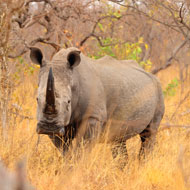Charity ‘shocked’ at BBC decision to broadcast Trophy

Born Free believes that legalising the trade in rhino horn could increase demand.
International wildlife charity, the Born Free Foundation, said it is ‘shocked and saddened’ at the BBC’s decision to broadcast controversial documentary Trophy.
The film, which explores the relationship between trophy hunting and conservation, was shown as part of Storyville on BBC4 last night (29 January). It was also shown in UK cinemas from 17 November 2017.
Born Free president Will Travers, who appears briefly in Trophy, said the film could “undermine” public trust in the BBC as it is “peppered with assumptions and assertions that go forward without challenge and are offered in an almost fact-free environment”.
Trophy sees film-makers Shaul Schwartz and Christina Clusiau, meeting breeders and hunters at the world’s largest hunting convention in Las Vegas. A common mantra of these businesses, according to the Trophy website, is that ‘if it pays, it stays’, which is a reference to the controversial notion that if monetary value is assigned to an animal, it will be considered ‘worth protecting’.
‘Canned’ trophy hunting, which allows big game to be legally hunted in a confined area, is legal in South Africa. Wild animals, particularly lions, are bred in captivity and opportunities to hunt them are auctioned off for huge sums.
Born Free said it is concerned the film offers a ‘one-sided’ view of trophy hunting. For example, the president of Safari Club International, Joe Hosmer, states unchallenged that all of the $50,000 from an elephant hunt will go towards conservation. According to Born Free, however, independent research shows that on average only three per cent of payments from trophy hunters actually reaches local communities.
The film also features the world’s largest private rhino breeder, John Hume, who believes that legalising the trade in rhino horn is the only way to protect the species. Mr Hume has nearly 1,500 rhino and trims their horns every two years. He has invested $50 million into the project and has stockpiled over five tonnes of horn.
Born Free believes that legalising the trade in rhino horn would ‘send the wrong message’ to consumers, increasing demand and opening up new markets. In 2008, legal sales of over 100 tonnes of ivory to China and Japan led to a huge and ongoing spike in elephant poaching.
Mandy Chang, commissioning editor of BBC Storyville and acquisitions, noted the charity’s concerns, but added: “…it is important to understand that this is a documentary and not a current affairs piece. I think people in the film reveal their agendas through their actions and I feel the film does reflect the different voices in the debate.”
Mr Travers urged the BBC to commission a documentary “that will present the true facts for and against trophy hunting, and that will properly examine both sides of the rhino horn trade argument”.



 The RCVS has announced a new version of its 1CPD mobile app, with enhanced features for veterinary surgeons and veterinary nurses to record their continuing professional development.
The RCVS has announced a new version of its 1CPD mobile app, with enhanced features for veterinary surgeons and veterinary nurses to record their continuing professional development.